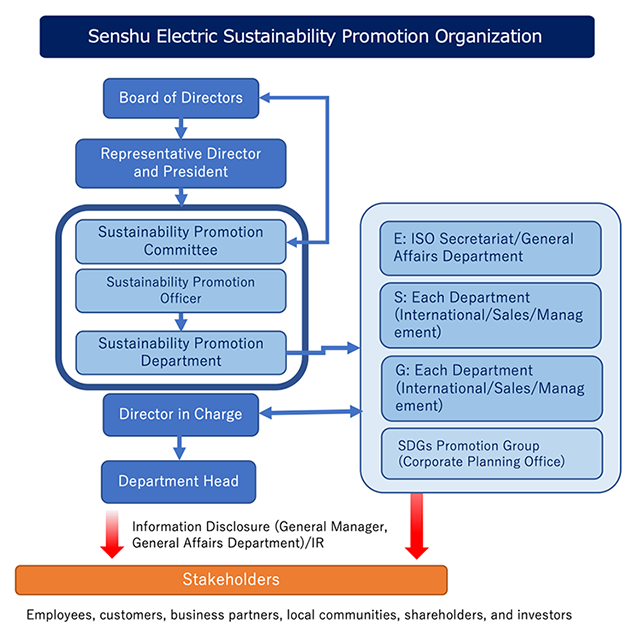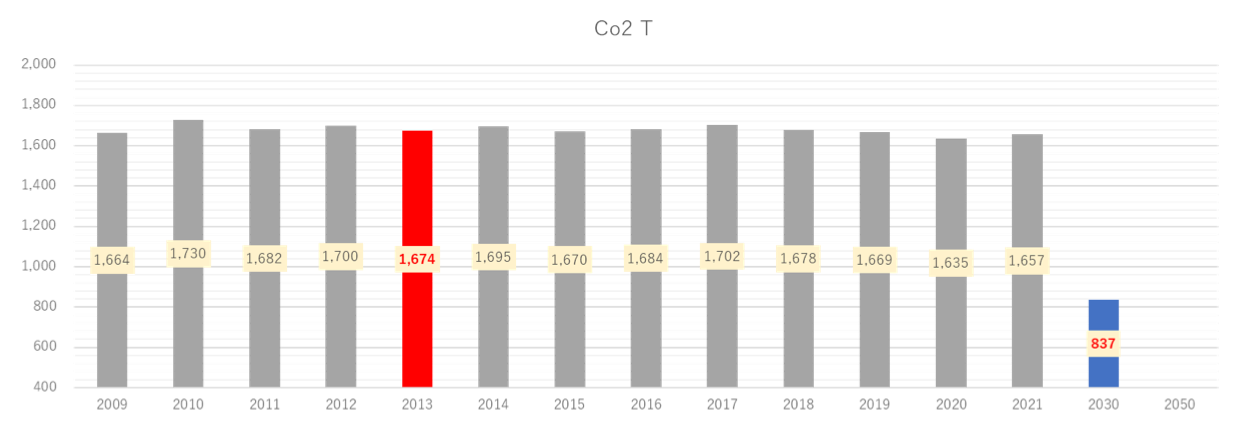ESG Activities
Information Disclosure Based on TCFD Recommendations
Supporting the Recommendations of the Task Force on Climate-related Financial Disclosures (TCFD)
In December 2021, Senshu Electric Co., Ltd. expressed its support for the TCFD (*) recommendations established by the Financial Stability Board (FSB).
In June 2004, we acquired ISO 14001 certification, established an environmental management system, and actively promoted environmental conservation activities as well as sales of environmentally conscious products in accordance with our president's quality and environmental policy.
Since 2004, we have reported on and disclosed our environmental activities and efforts to reduce CO2 emissions in our environmental report. However, we recognize that ensuring the sustainability of the global environment, which is the foundation of our business activities, is a top priority. We also recognize that the resolution of climate change, which is an issue shared by all humankind, is a demand of the international community. Therefore, we will continue to further enhance these efforts and disclose related information based on the TCFD recommendations.
(*) TCFD
An abbreviation for the Task Force on Climate-related Financial Disclosures. In June 2017, the Task Force released its final report (TCFD recommendations), which summarizes its recommendations on the disclosure of information on companies' efforts against climate change. The Task Force encourages companies to disclose information on climate-related risks and opportunities.
TCFDWebsite

Governance
a) To promote sustainable management across the Senshu Electric Group, the Board of Directors, which is the highest decision-making body for business execution, discusses and decides on specific measures to address environmental issues.
In addition, the Sustainability Promotion Committee convenes once every six months. At the meeting, the Board of Directors shares policies and other information to address environmental issues that they have discussed and decided on, and they formulate as well as monitor the progress of our group’s action plans to address environmental issues.
The Board of Directors receives reports on the contents of discussions and decisions made at meetings of the Sustainability Promotion Committee and debates as well as supervises our group’s policies and action plans to address environmental issues.
b) The Representative Director and President presides over the Board of Directors, chairs the Sustainability Promotion Committee, and is ultimately responsible for making management decisions on environmental issues.
The content of discussions and decisions made at meetings of the Sustainability Promotion Committee is ultimately reported to the Board of Directors.

Strategy
We are conducting a scenario analysis to assess the impact that different scenarios (global temperature increases of 1.5°C and 4°C) would have on our finances and business, and to assess the resilience of our company strategy in response to climate-related risks and opportunities.
Risk Management
Given the increasing complexity and uncertainty surrounding the corporate environment, it is essential to appropriately address risks that have a significant impact on corporate activities to implement our management strategies and business objectives.
The Senshu Electric Group positions climate-related issues as risks that have a significant impact on our management. As a result, the secretariat in charge of the Sustainability Promotion Committee conducts research and identifies climate-related risks as well as opportunities. The Sustainability Promotion Committee and Board of Directors then use this to assess and appropriately manage scenario analysis.
Indicators and Goals
Under the slogan “Carbon neutrality by fiscal 2050,” we have set short- and medium-term targets to realize our long-term vision for 2050.
Specifically, the target we hope to achieve by 2030 (Scope 1 + Scope 2) is a 50% reduction in CO2 emissions compared to fiscal 2013 levels.
As part of our efforts to achieve these targets, we will increase our usage rate for renewable energy sources to 30% or more by fiscal 2025.
Long-Term Goal
Carbon neutrality by 2050
Medium-Term Goal
50% reduction compared to fiscal 2013 by 2030

